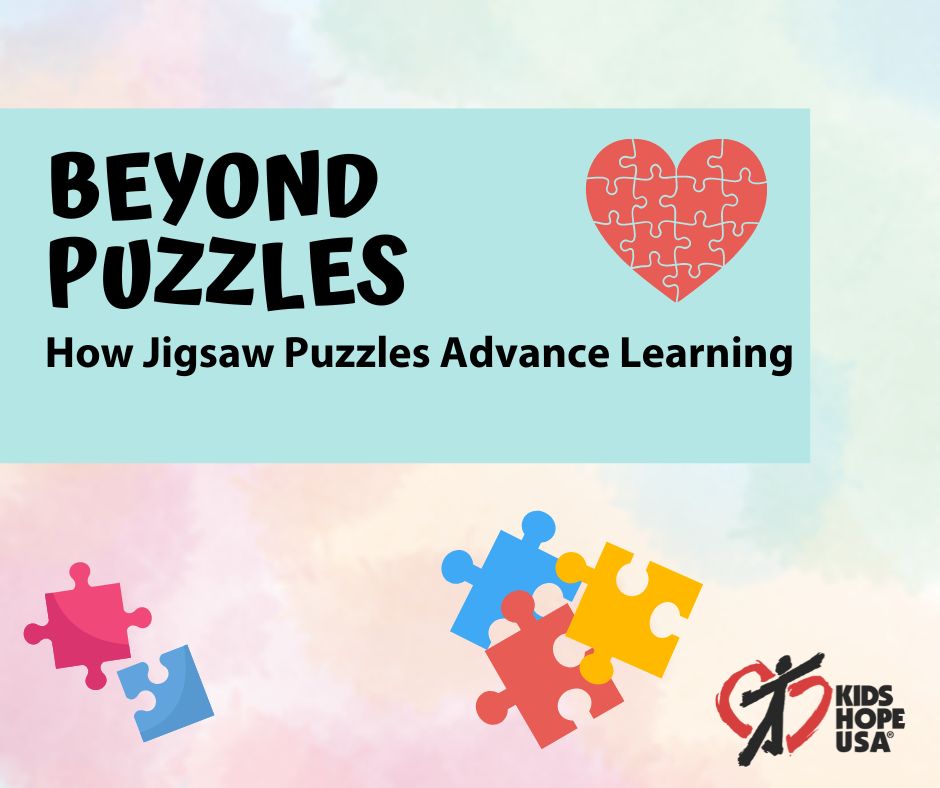
Have you ever struggled to complete a jigsaw puzzle? Completing a puzzle is a great mentoring activity to engage your student and work through hard things together. Puzzles are meant to be hard, but persevering through this struggle can advance development and help students gain crucial life-long skills.
Puzzles Teach Students How to Overcome Challenges
Let’s be honest, puzzles are hard. Trying to connect puzzle pieces in a specific way to create a specific picture takes time and you must pay close attention to detail. Completing puzzles during your mentoring hour allows students to practice their problem-solving skills and encourages resilience.
Trial and error is a great problem-solving skill that it is important to possess as you grow up. Students must learn to make mistakes and not give up when they are wrong. Making mistakes but getting back up again is what resilience is all about. In our blog post, The Intrapersonal Benefits of Mentoring, we learn how mentoring promotes resilience. By challenging your student to complete a puzzle through trial and error, they are developing such an important intrapersonal skill. Making mistakes but getting back up again is what resilience is all about. As the popular phrase goes, “If at first you don’t succeed, try, try again.”
Puzzles create an environment where these problem-solving skills are put to the test. Students will make mistakes, make incorrect moves, but they will learn to continue to try until they reach success.
Puzzles Increase Memory and Concentration
Just as trial-and-error advances learning, remembering what worked and what didn’t through this process advances a student’s concentration and memory skills. As students continue to try to connect pieces, they continue to learn and improve their memory. They remember the look and shape of pieces even when they don’t fit. Then, when they find a spot where one of those pieces could fit, they remember it and try again.
When trying to solve a jigsaw puzzle, your student must be focused. Keeping a student concentrated on the puzzle will develop their ability to stay focused on important tasks. Studies show that when you are unable to ignore distractions around you, you are more likely to forget things. Your short-term memory does not work as well when you get distracted often.
Working through a puzzle takes concentration and a sharp short-term memory. These skills developed through puzzle solving can then be applied to help students with their schoolwork so they can learn and grow.
Puzzles Help you See the Big Picture
Quite possibly the most important skill needed to complete a jigsaw puzzle is being able to see the big picture. Without the help of the picture on the box, completing a puzzle would be so much more difficult. Practicing this skill is a great way to teach your student how important it is to see the big picture.
In life, students will be challenged to see the big picture. Whether it’s seeing how their actions affect others or how their future work makes a difference in the world, this skill is crucial for student development. Just like a puzzle, students are challenged every day to see the big picture in their life. We’re all pieces of the same puzzle working together to make a difference in the world.
Something as simple as holding the door open for the person behind you creates a ripple effect that inspires kindness. Understanding the ripple effect is crucial to seeing the big picture of how your actions affect the world. Just as one ripple leads to another, each puzzle piece fits together and continues to grow the overall picture.
Advance Your Student’s Learning Through Puzzles
Solving a puzzle with your student is so much more than just completing the picture. This is a great way to spend time together and strengthen such important skills.
At Kids Hope USA, students and mentors meet one-on-one for one hour each week. This school-based mentoring program allows these kids to connect with a consistent and caring adult who shows up just for them.
If you are interested in learning more about being a mentor at Kids Hope USA, visit our mentoring program page!
